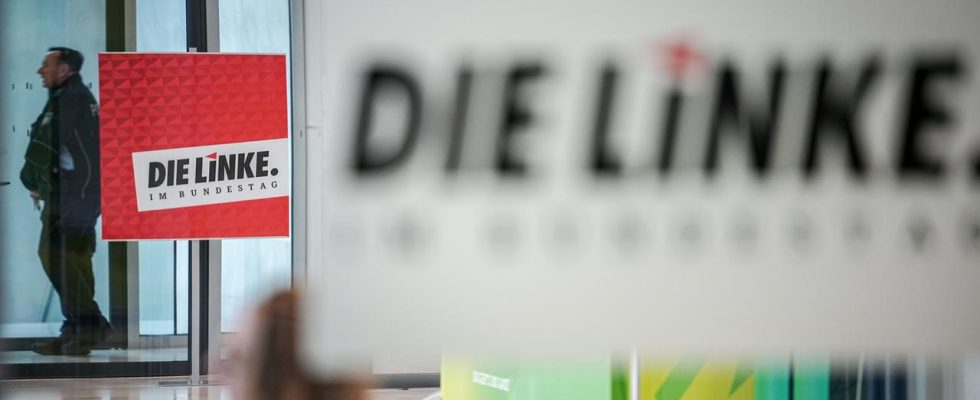The left is demanding that the wealth tax be reintroduced. The Basic Law does not contradict this. However, the tax was suspended in 1997. The Left’s stated goal is to “abolish” billionaires.
It is currently not easy for the left to attract attention with political demands. Since it no longer has parliamentary group status in the Bundestag due to the split from the Alliance Sahra Wagenknecht (BSW) and since its poll numbers have fallen below the five percent hurdle, its political influence has also been melting away.
Now the Left is unpacking a topic that is not new, but at least provides material for discussion in times of a budget crisis: The Left wants the wealth tax to be reintroduced. There will be a party executive committee decision on this at the weekend. The fight against the richest seems to be the left’s election campaign theme.
Specifically, the Left wants to tax it like this: One percent from net assets of one million euros, five percent from 50 million euros and twelve percent for assets above one billion euros.
Current discussion about social justice
Party leader Janine Wissler believes: “There should be no billionaires in a fair and democratic society.” In view of the crises that are currently being overcome, it is absurd that there are 237 billionaire families in Germany who pay neither wealth nor appropriate inheritance tax. “Unfortunately, the traffic light does nothing to combat this blatant injustice. It prefers to make cuts to social welfare and to those who already have little.”
The demand fits well into the current discussion about social justice and the debt brake. Because even if the left’s political assertiveness is currently low, the issue of redistributing wealth concerns many people.
A 2021 survey by the Bertelsmann Foundation showed that 77 percent of those surveyed were in favor of introducing wealth tax in Germany. However, only a minority of 37 percent say that they would be willing to pay more taxes themselves if this meant better financial support for poor people.
Bertelsmann Foundation
The Bertelsmann Foundation was founded in 1977 by the entrepreneur Reinhard Mohn, then head of the Bertelsmann media group. According to the group, foundations, including the Bertelsmann Foundation, now hold just over 80 percent of the shares in the Bertelsmann Group, which includes the RTL Group, the music company BMG, the Penguin Random House publishing group and service businesses.
For its studies, the Bertelsmann Stiftung collects and analyzes data and makes recommendations for action to the public and decision-makers. It works operationally, which means it does not support the work of third parties, but rather invests exclusively in self-initiated projects. According to its own statements, it serves the common good and is committed to political neutrality.
Not enforceable with the FDP
The president of the social association VdK, Verena Bentele, also criticizes the situation in Germany without a wealth tax: “The existing tax system cements social inequality. Hardly any country in the world taxes work more heavily and wealth less than Germany.”
However, in the current political constellation, the demand for a wealth tax is hardly feasible. And this despite the fact that the two traffic light partners, the SPD and the Greens, could certainly imagine such a tax. However, there is still the FDP – and they are strictly against it.
The financial policy spokesman for the FDP parliamentary group in the Bundestag, Markus Herbrand, makes a clear rejection of the reintroduction of the wealth tax: “Wanting to burden companies with additional taxes in times of greatest economic challenges is either not fully thought out or is deliberately aimed at targeting commercial companies from our country.”
The highest assets in Germany are not in bank accounts, but are invested “with a lot of sweat and effort in the numerous medium-sized and owner-managed companies.”
“Could trigger massive capital flight”
So would a wealth tax be a kind of tax concrete foothold that would place an undue burden on the German economy? The FDP receives approval from the President of the Ifo Economic Institute, Clemens Fuest.
He fears: “Such taxation would trigger a massive capital flight from Germany and lead to an economic decline. It should be borne in mind that very wealthy taxpayers in particular are generally not dependent on their income from work and can therefore easily change their place of residence and their economic activities can relocate abroad.”
Demand not limited to Germany
In contrast, the Left calculates that the five richest Europeans have increased their wealth by more than three quarters since 2020. The poor would get poorer, the few very rich would get richer. “It is therefore now sensible to think about how a different tax policy can be used to combat inequality,” says Martin Schirdewan, co-chair of the Left.
Incidentally, the Left does not want to limit its demand to Germany. She calls for wealth tax to be reintroduced across the EU. Since this project would have to go through the European Parliament, implementation here is also more than questionable.
Taking from the rich to give to the poor – the idea is not new. But he could focus some attention on the left again in the upcoming European elections.

